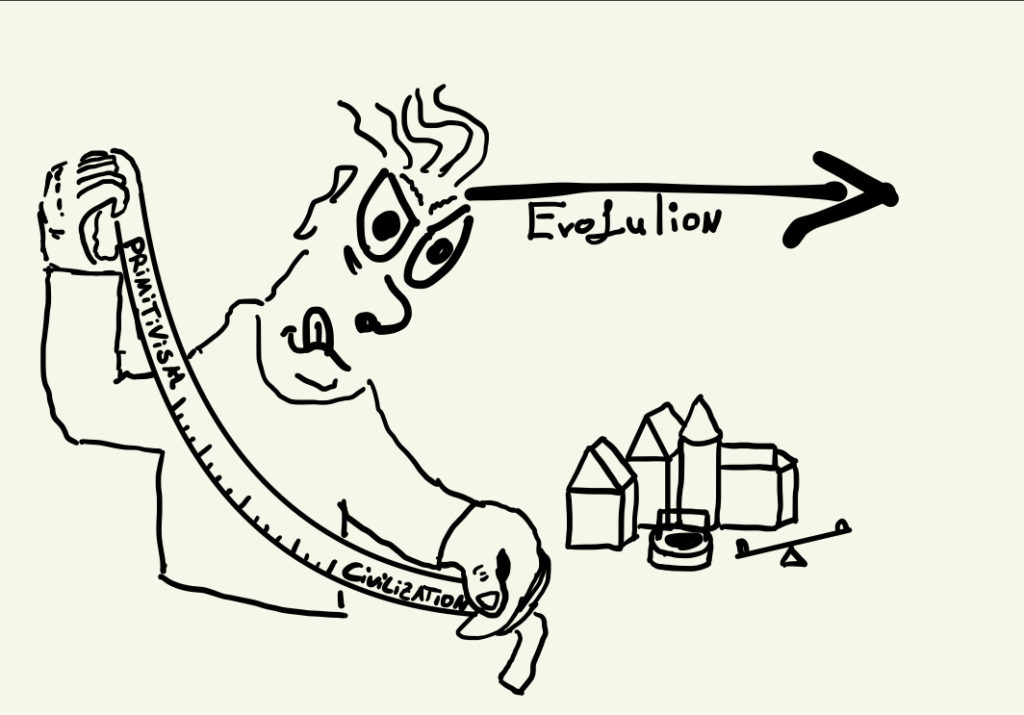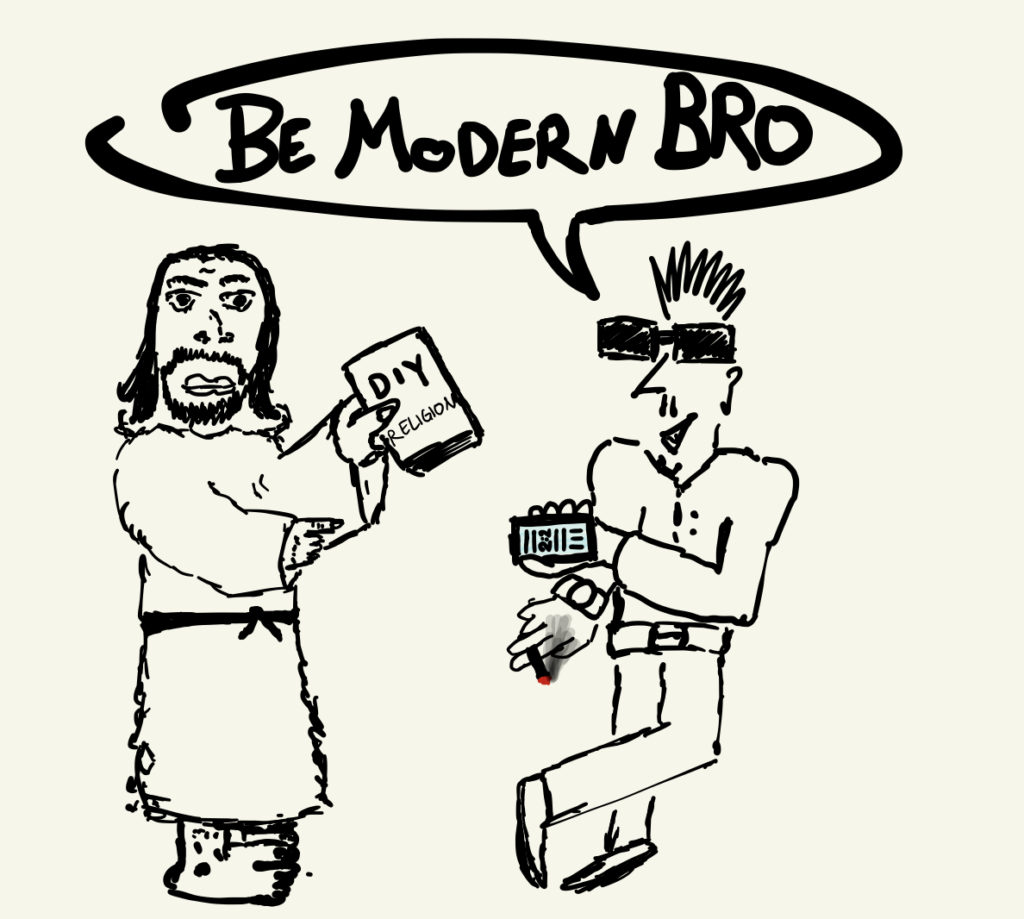+++ English Version below +++
(3) Das Paradigma der Rationalität als veralteter Ansatz der Weltanschauung
Das Paradigma der Rationalität umfasst ein bestimmtes Denkmuster, das seinen Ursprung in der Aufklärung findet und die Mentalität der Moderne dominiert. Dem Paradigma liegt ein rationaler, logischer sowie kausaler Denkansatz zugrunde, der auf folgenden drei Vorannahmen basiert: (1) die Ansicht einer gemeinsamen Welt, (2) die sich durch die Anwendung von Logik entschlüsseln lässt, (3) weil die Welt sich auf quantifizierbare sowie kausale Relationen reduzieren lässt.
- Die Annahme einer gemeinsamen Welt entsteht aus der Vorstellung, dass die Realität mehrere Perspektiven umfasst, dennoch existiert eine einzige universelle Wahrheit (Hall & Ames 1995, S. 2/55/64/68/104/156). Die Perspektive wird auf Grundlage einer genauen Darstellung der Welt entwickelt oder konstruiert, als ob der Beobachter abwesend wäre (ebd. S. 44). Mit dem Aufkommen der Moderne trägt die objektive Voreingenommenheit eine Behauptung der Universalität, die Vielfalt missachtet und alternative Denkansätze verringert (ebd. S. 14/68-69/90/145).
- Logik wird sowohl als a priori- als auch als dialektische Methode wissenschaftlicher Untersuchung wahrgenommen, wobei empirische Beweise oft übersehen werden (ebd. S. 3-11/ 39-40/55/114/145/156).
- Individuen, die den rationalen Denkmodus übernehmen, operieren nach vorher festgelegten Regeln der Kausalität, die dem Funktionieren der Welt zugrunde liegen (ebd. S. 11/52/76-78/129).
Die Ontologie oder Teleologie als westliche Traditionen setzen das rationale Denkmuster um, indem die Welt kausal sowie dualistisch wahrgenommen wird. In der Strömung der Postmoderne widerlegen die Geisteswissenschaften den stupiden Ansatz der Rationalität. Insbesondere Ethnolog:innen sind zum Ergebnis gekommen, dass es multiple Perspektiven gibt und dass eine Wahrheit immer relativ zu ihrem Kontext existieren kann. Das Ziel der Objektivität würde der Wissenschaft schaden, weil es die Perspektiven der Wissenschaftler:innen nur bestätigen würde.

In meiner Kreativitätsforschung identifiziere ich das rationale Denkmuster als den systemischen Denktyp, der mithilfe von Logik sowie Kausalität Probleme deduktiv, hermetisch löst. Der systemische Denktyp arbeitet in einem festgelegten Rahmen, der durch Vorannahmen, wie Objektivität, Universalität, Objektivität, Transzendenz usw. konstruiert wird. Das rationale Denkmuster bestätigt diesen Rahmen und betrachtet die Realitäten jenseits des Rahmens als irrelevant. Dem deduktiven Denken steht das Designdenken gegenüber, das den Rahmen verlässt. Eine Form des Designdenkens ist der Relativismus als wissenschaftliche Methode.

Eine ausführliche Erläuterung der Denktypen gibt es im folgenden Artikel.
Moderne vs. Postmoderne
Dieses Kapitel betrachtet die Strömungen der Moderne und der Post-Moderne. Es gibt viele, retrospektive Interpretationen der Strömung der Moderne, wobei die Postmoderne ihr gegenübersteht und sich stets dynamisch entwickelt. Der Unterschied zwischen Moderne als wissenschaftliche, epistemische Methode und der Modernisierungsstrategie der Moderne ist dabei hervorzuheben.
Die Bewegung der Moderne als wissenschaftlicher Ansatz beinhaltet unter anderem das Paradigma der Rationalität. In der Ethnologie ist die Strömung des Evolutionismus bekannt, in der insbesondere Lehnstuhlethnologen (!) das rationale Denkmuster verwenden, um fremde Kulturen mithilfe von quantitativen Standards in Entwicklungsstufen zu kategorisieren. Frühe Ethnologen gingen davon aus, dass unterschiedliche Kulturen abgeschlossene Organe bilden, die ein universelles Entwicklungsziel anstreben und sich logisch sowie kausal auf einem linearen Zeitstrahl einordnen lassen. „Primitive Kulturen“ seien daher ein „Fenster in die Vergangenheit“ für „zivilisierte Industriestaaten“. Der moderne Ansatz der Wissenschaft ist veraltert. Der wissenschaftliche Denkansatz der Moderne ist heutzutage nicht mehr haltbar, nicht zuletzt weil das Paradigma der Rationalität die eigenen Vorannahmen, wie der Universalität oder Kausalität, lediglich zu bestätigen suchte. Nach der Strömung des Evolutionismus koexistieren mehrere Denkströmungen, die das rationale Denkmuster sensitiver ausrichteten, bis zur Postmoderne.

Im Gegensatz zum modernen Ansatz der Wissenschaft zielt die Postmoderne auf ein relativistisches Paradigma, um einerseits die Bedingungen der Wissensproduktion zu hinterfragen und verdeckte Vorannahmen aufzudecken, andererseits stets progressive Erkenntnisse zu gewinnen.
Der Modernisierungsstrategie der Moderne bedienen sich Nationalstaaten, insbesondere Entwicklungsländer. Diese Modernisierung resultiert als Antwort auf die Globalisierung des Kapitalismus, aus dem Bedürfnis, die nationale Ökonomie und dadurch den sozialen Wohlstand zu fördern. Gründe hierfür sind nicht zuletzt der Kolonialismus, bei dem Kolonien ausgebeutet und sie an einen globalen Markt angebunden wurden. Bei der Modernisierung folgen insbesondere Entwicklungsländer dem Beispiel der Industrieländer. Dies geschieht sowohl auf einer West-Ost- als auch auf einer Nord-Süd-Achse.
Diese Modernisierungsstrategie beinhaltet das rationale Denkmuster der Moderne. Modernisierung wird durch die Ideologie des Kapitalismus gerechtfertigt. Nationalstaaten, die sich der Modernisierung bedienen, um den Wohlstand zu fördern, lassen sich ethisch schwer verurteilen. Letztlich ist es eine normative, wirtschaftspolitische Linie. China befindet sich zum Beispiel im Modernisierungsprozess, der mit einer Emanzipation und Unabhängigkeitsbewegung gegenüber der Wirtschaftsmacht der USA einhergeht. Das Ergebnis ist unter anderem eine wachsende Wirtschaft, der Zugang zu Bildung, ein Ausbau der Infrastruktur sowie eine außenpolitische Investmentstrategie für Entwicklungsprojekte im Ausland. Letzteres sei ein Versuch, die als unfair empfundene Globalisierung gerechter zu gestalten.
Während die Modernisierung lediglich den Zugang zu Bildung sowie die Wissenschaft fördert, ist der moderne Ansatz in der Wissenschaft äußerst hinderlich. Die Wissenschaft bedarf nämlich eines progressiven Ansatzes der Forschung sowie der Wissensproduktion. Es gilt, die Umwelt (hermeneutisch) zu verstehen, nicht jedoch zu rationalisieren.

+++ English Version +++
The paradigm of rationality as an outdated approach to worldview
The paradigm of rationality is a specific pattern of thought that traces its origins to the Enlightenment and dominates the mentality of modernity. This paradigm is rooted in a rational, logical, and causal approach to thinking, based on the following three assumptions: (1) the notion of a shared world, (2) which can be deciphered through the application of logic, and (3) because the world can be reduced to quantifiable and causal relations.
- The presumption of a shared world originates from the notion that reality encompasses multiple perspectives, yet there exists a singular universal truth (Hall & Ames 1995, pp.2/55/64/68/104/156). The perspective is developed or constructed based on an accurate representation of the world, as if the observer were absent (ibid. p.44). With the advent of modernity, the objective bias carries an assertion of universality that disregards diversity and diminishes alternative thought approaches (ibid. pp.14/68-69/90/145).
- Logic is perceived as both an a priori and dialectical method of scientific inquiry, often overlooking empirical evidence (ibid. pp.3-11/39-40/55/114/145/156).
- Individuals adopting the rational mode of thought operate on predetermined rules of causality that underpin the functioning of the world (ibid. pp.11/52/76-78/129).
The ontology or teleology, as Western traditions, operationalizes the rational thought pattern by perceiving the world causally and dualistically. Within the currents of postmodernity, the humanities challenge the simplistic approach of rationality. Particularly, ethnologists have concluded that there are multiple perspectives and that truth can always be relative to its context. The pursuit of objectivity would be detrimental to science, as it would merely affirm the perspectives of the scientists.

In my research on creativity, I identify the rational thinking pattern as the systemic type of thinking that deductively and hermetically solves problems using logic and causality. The systemic cognitive type operates within a predefined framework constructed by assumptions such as objectivity, universality, objectivity, transcendence, and others. The rational thinking pattern reinforces this framework and regards realities beyond it as irrelevant. In contrast to deductive thinking, there is design thinking, which ventures beyond the framework. One form of design thinking is relativism as a scientific method.

This link leads to more information on the topic of the different types of thinking.
Modernism vs. Postmodernism
This chapter examines the currents of modernism and postmodernism. There are numerous retrospective interpretations of the modernist movement, with postmodernism standing in contrast and continuously evolving. It is essential to emphasize the distinction between modernism as a scientific and epistemic method and the modernization strategy associated with it.
The modernist movement as a scientific approach includes, among other things, the paradigm of rationality. In ethnology, the stream of evolutionism is recognized, wherein armchair ethnologists, in particular, employ the rational thinking pattern to categorize foreign cultures into developmental stages using quantitative standards. Early ethnologists assumed that different cultures form distinct entities striving for a universal developmental goal, and can logically and causally be placed on a linear timeline. „Primitive cultures“ were thus considered a „window into the past“ for „civilized industrial states.“ The contemporary scientific approach of modernism is outdated. The scientific thinking paradigm of modernism is no longer tenable in today’s context, not least because the paradigm of rationality merely sought to confirm its own assumptions, such as universality or causality. Following the evolutionism stream, several currents of thought coexist that directed the rational thinking pattern with greater sensitivity, leading up to postmodernism.

In contrast to the modern scientific approach, postmodernity aims for a relativistic paradigm, seeking on one hand to question the conditions of knowledge production and uncover hidden assumptions, and on the other hand, consistently generate progressive insights.
The modernization strategy of modernism is employed by nation-states, especially developing countries. This modernization is a response to the globalization of capitalism, driven by the need to promote national economies and thus social well-being. This is, in part, a response to colonialism, during which colonies were exploited and integrated into a global market. In pursuing modernization, developing countries often follow the lead of industrialized nations. This occurs along both a West-East axis and a North-South axis.
This modernization strategy encompasses the rational thinking pattern of modernism. Modernization is justified by the ideology of capitalism. Nation-states utilizing modernization to promote prosperity are difficult to ethically condemn. Ultimately, it represents a normative, economic policy line. China, for example, is currently undergoing a process of modernization that coincides with an emancipation and independence movement from the economic power of the USA. The outcome includes a growing economy, improved access to education, infrastructure expansion, and a foreign investment strategy for development projects abroad. The latter is an attempt to make globalization, which is often perceived as unfair, more equitable.
While modernization primarily fosters access to education and science, the modern scientific approach is highly detrimental. Science requires a progressive approach to research and knowledge production. The objective is to understand the environment (hermeneutically) rather than rationalize it.

Literatur
- Hall, David L. and Roger T. Ames (1995): ANTICIPATING CHINA. Thinking through the Narratives of Chinese and Western Culture. STATE UNIVERSITY OF NEW YORK PRESS.

Autor & Redaktion: Felix Keilhack (LMU)


